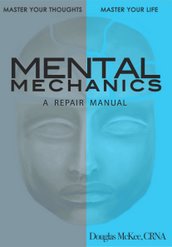Of all the areas that are difficult to truly grasp, understanding our own thinking process has to be at the top of the list. We have been taught that the entire subject is shrouded in biochemistry, unfathomable genetic process, emotional injuries sustained in childhood, and quantum physics that defy logic. Even the experts can not come to any kind of usable consensus. No wonder so many problems arise from processes we all must use every minute of our waking day.
Thankfully, my parents, teachers, and friends did not realize learning how to do something was so impossibly difficult. My mother taught me how to swim at age three; my father taught me how to ride a bike, and so on. They managed to teach me an incredible amount by age eight. After that if I wanted to understand how to do something, my first step was to ask someone who knew how to do it teach me how to do it.
We can fast forward to an adult me in my late thirties wondering why life was so difficult. Why are relationships so likely to fail and why raising children is at one time, the most rewarding thing we can do and the most frustrating exercise in futility? Instead of giving up I decided to learn to meditate because I was told that meditation was the path to personal peace and tranquility. It is that, but the world I left behind when I went into my bedroom to meditate was still lurking outside the door to cause me the same old problems after my meditation was finished.
Trying to understand what to do and how to do it to make my life different, somehow led me to an incredible conclusion. If I wanted to learn how to be a happy, peaceful, and productive adult, I should ask the adults who are, if I could find them. That conclusion started a process that goes on still but many, if not most, of the questions I had then have been answered, only to give rise to others more intriguing and marvelous, but the process of asking, learning, and practicing has become a way of life and continues to yield amazing results.
Since I wanted to become successful in many different areas of my life it seemed to be reasonable to study how successful people do the things they do. Little did I know there was so much information available. Asking “how” instead of “why” was a very different direction than that being used by most “experts,” but it was the most important decision I would ever make. I almost always know the why I want to do something but Motivation is NOT a Skill Set. What is missing is the how, the skills necessary, to do those things successfully.
We don't need to know how the engine in our car works to drive a car. We don't need to know how a computer works to surf the internet. And we certainly don't need to understand the biochemistry of our brain to be able to take control of the thought processes going on in it.
Thinkers, philosophers, visionaries, saints, and all successful people all have something very important in common. We are all included in these categories because we share those same very important things and you will soon see that you really do. I don't have to prove a thing. You can do that for yourself.
The proof is all around us and in many of the things we already do every day. I accidentally discovered the key to a happy, peaceful, and prosperous life in the eighth grade so it is actually quite easy to understand. I just didn't realize what it was or how to apply it to the other areas in my life that caused me problems for the next 40 years. I still often feel like the guy in the V-8 commercial.
For a bit I am going to ask you to consider everything you know as simply data, including emotions, beliefs, and preferences.
Our brain is marvelous. The more we study it the more miraculous the whole thing becomes. It is storing a huge amount of data every second we are awake. The smart part compares incoming data from our senses to what we have already experienced so it can apply meaning to it. This allows us to use the data to relate to what is going on around us. We do not experience many things directly.
This is a really simple explanation of what is going on but it is sufficient to show us what we need to know. All our brains work the same way.
When we all went to school, we were only taught the rules and tools for handling two kinds of information; arithmetic and grammar. Neither of those two types of information are responsible for the emotional disorders that are exploding in our cultures today.
The types of information that cause most of our problems today are emotions, needs, wants, self-esteem, relationships and work and they do so because we were not taught the rules and tools that would allow us to handle them correctly.
Think back to how we were taught arithmetic and grammar. We went over and over and over the same material until it became an automatic response that we didn't have to think about. Spelling, multiplication tables, colors, shapes, and all the items that we encounter every day were pounded into our brains until a recently described process named Long Term Potentiation, or LTP, turned that repetitive thinking into a simple habit that no longer required any thinking.
Learning to drive is another good another example. The amount of concentration and attention that went into learning how to drive was incredible because the possibility of danger was so high. How much attention do any of us need to pay to our driving now? Almost none and it is because the same LTP turned the learning experience into a habit.
LTP is an incredible process. Most animals exhibit it and to be sure it is a really limiting factor in their behavior as well as it is in ours. Fleas for instance can be trained not to jump out of a jar by keeping a lid on the jar. After jumping up and banging their heads on the lid so many times, the fleas simply quit jumping that high so the lid can be removed and the fleas don't jump out any more.
So when you hear someone referring to another person as being "flea brained," it means the other person is obviously using very little of the intelligent part of their brain at the time. And this can actually be said for each of us most of the time.
skip to main |
skip to sidebar
"Wisdom is the freedom and ability to make the kinds of choices that move our lives forward and benefit the planet."





